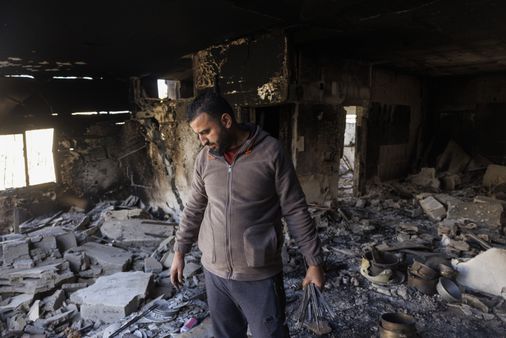But Netanyahu’s new government — an alliance of settler activists, religious conservatives, and hard-line nationalists — rose to power promising to expand the occupation of the West Bank, and to implement harsher measures to counter Palestinian violence. A survey last week by the Palestinian Center for Policy and Survey Research shows that support for a two-state solution in the region is at an all-time low, with only one-third of Palestinians and one-third of Jewish Israelis backing the creation of two states.
In a joint news conference with Netanyahu, after days of escalating bloodshed, Blinken said that maintaining the “vision” of a two-state solution, in which a Palestinian state would be created alongside Israel, was “the only way forward.”
JERUSALEM — Secretary of State Antony Blinken called for calm at a time of cascading violence during his visit to Jerusalem on Monday, the most high-profile US engagement with Israel since the inauguration of Prime Minister Benjamin Netanyahu’s far-right government last month.
Blinken offered his condolences for the seven victims of a mass killing Friday allegedly by a Palestinian gunman outside a synagogue in East Jerusalem, which he called “more than an attack on individuals. It was also an attack on the universal act of practicing one’s faith.”
Advertisement
“In the context of this attack, and escalating violence, it’s important that the government and people of Israel know America’s commitment to their security remains ironclad,” Blinken continued.
That attack came a day after 10 Palestinians were killed in an Israeli raid on the Jenin refugee camp, one of the deadliest operations in the West Bank in two decades. At least 30 Palestinians have been killed in the West Bank this year, according to the Palestinian Health Ministry.
The violence, and the remote likelihood of progress toward peace between the two parties, cast a shadow over Blinken’s visit, which was intended to convey President Biden’s strong support for Israel while outlining White House priorities in its quest to stabilize, if not solve, the conflict.
Advertisement
Those include opposition to altering the status quo on sensitive sites such as the Temple Mount — an issue that has pitted Washington against some of Netanyahu’s coalition partners — and urging governance reforms by the Palestinian Authority. Blinken is expected to meet Tuesday with the Palestinian Authority’s president, Mahmoud Abbas.
In response to the attack at the synagogue, Israeli authorities announced new antiterrorism proposals and a loosening of restrictions on civilian gun ownership, but they did not retaliate with military strikes, raising hopes of de-escalation.
“That’s why we’re urging all sides now to take urgent steps to restore calm,” Blinken said, so “we can start to restore a sense of security.”
Underscoring the challenge of any lasting calm, Israel’s far-right National Security Minister Itamar Ben Gvir demanded Sunday that in exchange for the seven killed on Friday, the government should authorize seven illegal settlements in the West Bank, part of the land that Palestinians see as being included in their future state.
The last serious attempt to move forward on two-state talks took place during the Obama administration in 2014. That effort, led by then-Secretary of State John F. Kerry, went essentially nowhere. As a frustrated Kerry left his post in 2016, he warned Netanyahu that Israel “will never have true peace” with the Arab world without solving the Palestinian question.
Advertisement
During the Trump years, Israel began to normalize relations with Persian Gulf states, including the United Arab Emirates and Bahrain, as part of the US-backed Abraham Accords. Building on the accords, especially with Saudi Arabia, is a priority for the Israeli prime minister, who spoke Monday of “expanding the circle of peace” in the region. But Washington has privately warned Netanyahu that further normalization with Arab states is unlikely as long as his government is in turmoil.
“My approach is, you, Prime Minister Netanyahu, want to get big things done, we want to get big things done,” US Ambassador to Israel Tom Nides told The Washington Post recently. “But if your backyard is on fire, then we can’t get anything done.”
Aaron David Miller, a former State Department negotiator who is now a scholar at the Carnegie Endowment for International Peace, said Biden’s focus on Russia and China meant that maintaining a semblance of stability in the Middle East was now the chief US goal in the region.
He said the synagogue shooting made it even less likely that Blinken would use the trip to push Israel forcefully on areas where the two countries disagree. The Biden administration has previously criticized Israeli plans to expand settlements in the West Bank.
“If there was going to be any pressure, it dissipated on Friday in the worst terror attack on Israelis in 15 years,” Miller said. “If there’s going to be any pressure, it’s going to be on Abbas,” he said, to condemn the shooting and end the suspension of security cooperation with Israeli authorities.
Advertisement
On Monday, Netanyahu hailed Israel’s relationship with the United States as “one of the great alliances in modern history.”
“We share common values, two strong democracies — which will remain, I assure you, two strong democracies,” Netanyahu said, addressing US concerns over a proposed judicial overhaul that could allow the prime minister to escape prosecution in multiple corruption trials.
Critics have warned that the measures would destroy the country’s system of checks and balances, and tens of thousands of Israelis have taken to the streets of Tel Aviv in recent weeks to protest what they call a “constitutional coup.”
It wasn’t immediately clear whether Blinken would issue any forceful warnings to Israeli officials over the judicial proposals or the positions of some of Netanyahu’s coalition partners.
In his remarks, Netanyahu sought to move past his own domestic controversies and the current violence, alluding only briefly to finding “a workable solution with our Palestinian neighbors,” and pivoted quickly to common ground with the United States over Iran.
Blinken reaffirms ‘vision’ for two states as Israeli-Palestinian violence surges
RELATED ARTICLES



